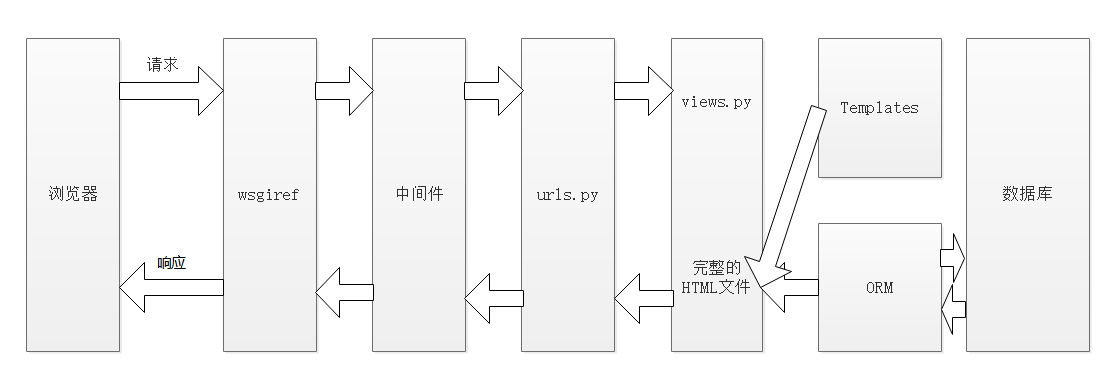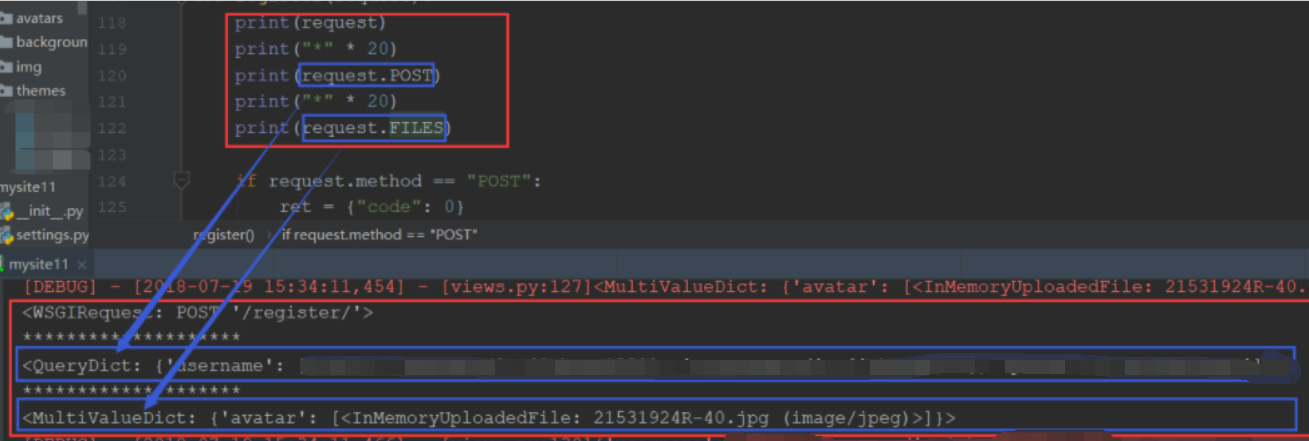Django请求流程图

1.客户端发送请求
2.wsgiref是Django封装的套接字,它将客户端发送过来的请求(请求头、请求体封装成request)
1)解析请求数据
2)封装响应数据
3.中间件,进项身份验证等
MIDDLEWARE = [ 'django.middleware.security.SecurityMiddleware', 'django.contrib.sessions.middleware.SessionMiddleware', 'django.middleware.common.CommonMiddleware', 'django.middleware.csrf.CsrfViewMiddleware', 'django.contrib.auth.middleware.AuthenticationMiddleware', 'django.contrib.messages.middleware.MessageMiddleware', 'django.middleware.clickjacking.XFrameOptionsMiddleware', ]
4.路由系统
urls映射到相应的视图
5.ORM对象关系映射,对数据库读写操作
7.templates模板,进行页面渲染
8.response响应
补充:
请求头ContentType编码类型:
1)application/x-www-form-urlencoded,form表单默认的POST提交数据的方式,wsgiref中默认只解析该方法提交过来的数据
2)multipart/form-data,form表单通过POST提交文件时需指定的方式
3)text/plain,这种方式几乎用不到
此外,在AJAX提交请求中可通过ContentType参数指定提交的方式,例如用户自定义的application/json,用来告诉服务端消息的主体是序列化后的JSON字符串,可用在要提交的数据层次比较深的场景,将数据进行序列化之后再进行提交或者将JSON字符串作为键值以application/x-www-form-urlencoded方式进行提交
没有指定编码类型的情况下提交数据,在服务端可通过request内置的指定方法获取数据:
print(request.body) # 原始的请求体数据 print(request.GET) # GET请求数据 print(request.POST) # POST请求数据 print(request.FILES) # 上传的文件数据

Django内HttpRegiste和WSGIRequest源码:


class HttpRequest: """A basic HTTP request.""" # The encoding used in GET/POST dicts. None means use default setting. _encoding = None _upload_handlers = [] def __init__(self): # WARNING: The `WSGIRequest` subclass doesn't call `super`. # Any variable assignment made here should also happen in # `WSGIRequest.__init__()`. self.GET = QueryDict(mutable=True) self.POST = QueryDict(mutable=True) self.COOKIES = {} self.META = {} self.FILES = MultiValueDict() self.path = '' self.path_info = '' self.method = None self.resolver_match = None self._post_parse_error = False self.content_type = None self.content_params = None def __repr__(self): if self.method is None or not self.get_full_path(): return '<%s>' % self.__class__.__name__ return '<%s: %s %r>' % (self.__class__.__name__, self.method, self.get_full_path()) def _get_raw_host(self): """ Return the HTTP host using the environment or request headers. Skip allowed hosts protection, so may return an insecure host. """ # We try three options, in order of decreasing preference. if settings.USE_X_FORWARDED_HOST and ( 'HTTP_X_FORWARDED_HOST' in self.META): host = self.META['HTTP_X_FORWARDED_HOST'] elif 'HTTP_HOST' in self.META: host = self.META['HTTP_HOST'] else: # Reconstruct the host using the algorithm from PEP 333. host = self.META['SERVER_NAME'] server_port = self.get_port() if server_port != ('443' if self.is_secure() else '80'): host = '%s:%s' % (host, server_port) return host def get_host(self): """Return the HTTP host using the environment or request headers.""" host = self._get_raw_host() # Allow variants of localhost if ALLOWED_HOSTS is empty and DEBUG=True. allowed_hosts = settings.ALLOWED_HOSTS if settings.DEBUG and not allowed_hosts: allowed_hosts = ['localhost', '127.0.0.1', '[::1]'] domain, port = split_domain_port(host) if domain and validate_host(domain, allowed_hosts): return host else: msg = "Invalid HTTP_HOST header: %r." % host if domain: msg += " You may need to add %r to ALLOWED_HOSTS." % domain else: msg += " The domain name provided is not valid according to RFC 1034/1035." raise DisallowedHost(msg) def get_port(self): """Return the port number for the request as a string.""" if settings.USE_X_FORWARDED_PORT and 'HTTP_X_FORWARDED_PORT' in self.META: port = self.META['HTTP_X_FORWARDED_PORT'] else: port = self.META['SERVER_PORT'] return str(port) def get_full_path(self, force_append_slash=False): # RFC 3986 requires query string arguments to be in the ASCII range. # Rather than crash if this doesn't happen, we encode defensively. return '%s%s%s' % ( escape_uri_path(self.path), '/' if force_append_slash and not self.path.endswith('/') else '', ('?' + iri_to_uri(self.META.get('QUERY_STRING', ''))) if self.META.get('QUERY_STRING', '') else '' ) def get_signed_cookie(self, key, default=RAISE_ERROR, salt='', max_age=None): """ Attempt to return a signed cookie. If the signature fails or the cookie has expired, raise an exception, unless the `default` argument is provided, in which case return that value. """ try: cookie_value = self.COOKIES[key] except KeyError: if default is not RAISE_ERROR: return default else: raise try: value = signing.get_cookie_signer(salt=key + salt).unsign( cookie_value, max_age=max_age) except signing.BadSignature: if default is not RAISE_ERROR: return default else: raise return value def get_raw_uri(self): """ Return an absolute URI from variables available in this request. Skip allowed hosts protection, so may return insecure URI. """ return '{scheme}://{host}{path}'.format( scheme=self.scheme, host=self._get_raw_host(), path=self.get_full_path(), ) def build_absolute_uri(self, location=None): """ Build an absolute URI from the location and the variables available in this request. If no ``location`` is specified, bulid the absolute URI using request.get_full_path(). If the location is absolute, convert it to an RFC 3987 compliant URI and return it. If location is relative or is scheme-relative (i.e., ``//example.com/``), urljoin() it to a base URL constructed from the request variables. """ if location is None: # Make it an absolute url (but schemeless and domainless) for the # edge case that the path starts with '//'. location = '//%s' % self.get_full_path() bits = urlsplit(location) if not (bits.scheme and bits.netloc): current_uri = '{scheme}://{host}{path}'.format(scheme=self.scheme, host=self.get_host(), path=self.path) # Join the constructed URL with the provided location, which will # allow the provided ``location`` to apply query strings to the # base path as well as override the host, if it begins with // location = urljoin(current_uri, location) return iri_to_uri(location) def _get_scheme(self): """ Hook for subclasses like WSGIRequest to implement. Return 'http' by default. """ return 'http' @property def scheme(self): if settings.SECURE_PROXY_SSL_HEADER: try: header, value = settings.SECURE_PROXY_SSL_HEADER except ValueError: raise ImproperlyConfigured( 'The SECURE_PROXY_SSL_HEADER setting must be a tuple containing two values.' ) if self.META.get(header) == value: return 'https' return self._get_scheme() def is_secure(self): return self.scheme == 'https' def is_ajax(self): return self.META.get('HTTP_X_REQUESTED_WITH') == 'XMLHttpRequest' @property def encoding(self): return self._encoding @encoding.setter def encoding(self, val): """ Set the encoding used for GET/POST accesses. If the GET or POST dictionary has already been created, remove and recreate it on the next access (so that it is decoded correctly). """ self._encoding = val if hasattr(self, 'GET'): del self.GET if hasattr(self, '_post'): del self._post def _initialize_handlers(self): self._upload_handlers = [uploadhandler.load_handler(handler, self) for handler in settings.FILE_UPLOAD_HANDLERS] @property def upload_handlers(self): if not self._upload_handlers: # If there are no upload handlers defined, initialize them from settings. self._initialize_handlers() return self._upload_handlers @upload_handlers.setter def upload_handlers(self, upload_handlers): if hasattr(self, '_files'): raise AttributeError("You cannot set the upload handlers after the upload has been processed.") self._upload_handlers = upload_handlers def parse_file_upload(self, META, post_data): """Return a tuple of (POST QueryDict, FILES MultiValueDict).""" self.upload_handlers = ImmutableList( self.upload_handlers, warning="You cannot alter upload handlers after the upload has been processed." ) parser = MultiPartParser(META, post_data, self.upload_handlers, self.encoding) return parser.parse() @property def body(self): if not hasattr(self, '_body'): if self._read_started: raise RawPostDataException("You cannot access body after reading from request's data stream") # Limit the maximum request data size that will be handled in-memory. if (settings.DATA_UPLOAD_MAX_MEMORY_SIZE is not None and int(self.META.get('CONTENT_LENGTH') or 0) > settings.DATA_UPLOAD_MAX_MEMORY_SIZE): raise RequestDataTooBig('Request body exceeded settings.DATA_UPLOAD_MAX_MEMORY_SIZE.') try: self._body = self.read() except IOError as e: raise UnreadablePostError(*e.args) from e self._stream = BytesIO(self._body) return self._body def _mark_post_parse_error(self): self._post = QueryDict() self._files = MultiValueDict() self._post_parse_error = True def _load_post_and_files(self): """Populate self._post and self._files if the content-type is a form type""" if self.method != 'POST': self._post, self._files = QueryDict(encoding=self._encoding), MultiValueDict() return if self._read_started and not hasattr(self, '_body'): self._mark_post_parse_error() return if self.content_type == 'multipart/form-data': if hasattr(self, '_body'): # Use already read data data = BytesIO(self._body) else: data = self try: self._post, self._files = self.parse_file_upload(self.META, data) except MultiPartParserError: # An error occurred while parsing POST data. Since when # formatting the error the request handler might access # self.POST, set self._post and self._file to prevent # attempts to parse POST data again. # Mark that an error occurred. This allows self.__repr__ to # be explicit about it instead of simply representing an # empty POST self._mark_post_parse_error() raise elif self.content_type == 'application/x-www-form-urlencoded': self._post, self._files = QueryDict(self.body, encoding=self._encoding), MultiValueDict() else: self._post, self._files = QueryDict(encoding=self._encoding), MultiValueDict() def close(self): if hasattr(self, '_files'): for f in chain.from_iterable(l[1] for l in self._files.lists()): f.close() # File-like and iterator interface. # # Expects self._stream to be set to an appropriate source of bytes by # a corresponding request subclass (e.g. WSGIRequest). # Also when request data has already been read by request.POST or # request.body, self._stream points to a BytesIO instance # containing that data. def read(self, *args, **kwargs): self._read_started = True try: return self._stream.read(*args, **kwargs) except IOError as e: raise UnreadablePostError(*e.args) from e def readline(self, *args, **kwargs): self._read_started = True try: return self._stream.readline(*args, **kwargs) except IOError as e: raise UnreadablePostError(*e.args) from e def __iter__(self): while True: buf = self.readline() if not buf: break yield buf def xreadlines(self): warnings.warn( 'HttpRequest.xreadlines() is deprecated in favor of iterating the ' 'request.', RemovedInDjango30Warning, stacklevel=2, ) yield from self def readlines(self): return list(self)


class WSGIRequest(HttpRequest): def __init__(self, environ): script_name = get_script_name(environ) path_info = get_path_info(environ) if not path_info: # Sometimes PATH_INFO exists, but is empty (e.g. accessing # the SCRIPT_NAME URL without a trailing slash). We really need to # operate as if they'd requested '/'. Not amazingly nice to force # the path like this, but should be harmless. path_info = '/' self.environ = environ self.path_info = path_info # be careful to only replace the first slash in the path because of # http://test/something and http://test//something being different as # stated in http://www.ietf.org/rfc/rfc2396.txt self.path = '%s/%s' % (script_name.rstrip('/'), path_info.replace('/', '', 1)) self.META = environ self.META['PATH_INFO'] = path_info self.META['SCRIPT_NAME'] = script_name self.method = environ['REQUEST_METHOD'].upper() self.content_type, self.content_params = cgi.parse_header(environ.get('CONTENT_TYPE', '')) if 'charset' in self.content_params: try: codecs.lookup(self.content_params['charset']) except LookupError: pass else: self.encoding = self.content_params['charset'] self._post_parse_error = False try: content_length = int(environ.get('CONTENT_LENGTH')) except (ValueError, TypeError): content_length = 0 self._stream = LimitedStream(self.environ['wsgi.input'], content_length) self._read_started = False self.resolver_match = None def _get_scheme(self): return self.environ.get('wsgi.url_scheme') @cached_property def GET(self): # The WSGI spec says 'QUERY_STRING' may be absent. raw_query_string = get_bytes_from_wsgi(self.environ, 'QUERY_STRING', '') return QueryDict(raw_query_string, encoding=self._encoding) def _get_post(self): if not hasattr(self, '_post'): self._load_post_and_files() return self._post def _set_post(self, post): self._post = post @cached_property def COOKIES(self): raw_cookie = get_str_from_wsgi(self.environ, 'HTTP_COOKIE', '') return parse_cookie(raw_cookie) @property def FILES(self): if not hasattr(self, '_files'): self._load_post_and_files() return self._files POST = property(_get_post, _set_post)